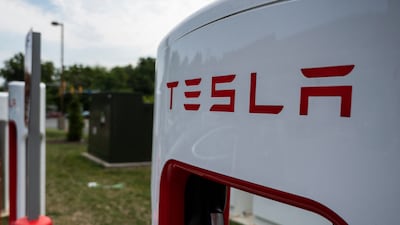Electric vehicle maker Tesla unveiled a new computer chip, designed entirely in-house, which will be used in the company’s supercomputer, Dojo.
Unveiled at the company’s online AI Day event on Thursday, the new D1 chip will be used to train artificial intelligence networks in Tesla’s data centres.
The California-based company said it is placing up to 25 D1 chips on to a single training tile and 120 of these tiles will be joined together across various servers. This will make the calculations several times faster than most supercomputers in use today.
“This was entirely designed by the Tesla team internally … all the way from the architecture to the package,” said Ganesh Venkataramanan, senior director of autopilot hardware at Tesla.
“We can do [computations] and data transfers simultaneously … this is a pure machine-learning machine,” said Mr Venkataramanan.

Supercomputers are far more powerful than general-purpose computers and are typically used to address the most demanding problems in the world. These include developing models to discover new medicine, fight a pandemic, explore oil and gas reserves, simulate nuclear weapon explosions, forecast weather and research climate issues.
US technology companies such as Microsoft, IBM and Google are competing to develop improved supercomputer technology. Quantum physicists at Abu Dhabi’s Technology Innovation Institute are building the Middle East’s first quantum supercomputer.
Dojo, which is expected to be operational next year, will not only be part of the technology for Tesla’s full self-driving system that offers more enhanced features such as auto-parking and automatic lane changes.
“This is not intended to be just limited to Tesla cars,” the company's billionaire chief executive Elon Musk said.
“Those of you who’ve seen the full self-driving beta can appreciate the rate at which the Tesla neural net is learning to drive. And this is a particular application of AI, but I think there’s more applications down the road that will make sense,” he said.
Mr Musk described Tesla as a company with “deep AI activity in hardware on the inference level and on the training level” at the company’s AI Day event.
“There’s a tremendous amount of work to make it work and that’s why we need talented people to join and solve the problem,” he said.
Tesla said it aims to produce most of the technology in-house to avoid future supply chain disruptions and trade bottlenecks.
Last year, Tesla unveiled a computer chip produced by South Korean technology company Samsung, but this did not shield the company from the Covid-induced chip shortage.
This month, Mr Musk said the company is facing severe supply chain constraints, with the most problematic being sourcing components from Japan’s Renesas and Germany’s Robert Bosch.
In its earning call last month, Tesla said continued supply constraints will have a “strong influence on the rate of delivery growth” for the rest of this year. The company, which delivered a record 201,250 vehicles in the second quarter, said it had to rewrite the vehicle software to support the alternate chips to minimise the impact of global scarcity.
Tesla also aims to launch a humanoid robot prototype next year, Mr Musk said. The Tesla bot will be designed for risky, repetitive and boring tasks.
About 173 centimetres tall, the robots will be programmed to do various monotonous jobs such as assembling car parts, moving components around factories and picking up groceries.


